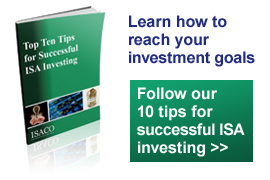 Recently we looked more closely at the fund charges faced by investors. In this post we'll consider whether the cost of active fund management can be justified when compared to the charges made by passive funds.
Recently we looked more closely at the fund charges faced by investors. In this post we'll consider whether the cost of active fund management can be justified when compared to the charges made by passive funds.
FundsNetwork recently analysed the most widely held funds1 and found the average total cost of owning a typical actively-managed £10,000 investment was £16.67 per month, or £200 a year.
This total cost of active fund management was on average made up of:
- Investment management charge: 0.75%
- Service and administration charge: 0.14%
- Cost of advice: 0.5%
- Platform charge: 0.25%
- Dealing costs: 0.36%.
This means that if you purchase a typical actively managed fund, you should expect the charges to be around 2% per year in total.
However, Fidelity also found that the typical total annual charges for a ‘low cost’ active fund would be approximately 1.45% per year, while a passive ‘tracker fund’ was even lower at 0.39% per year.
So is the extra cost of active fund managment justified?
Source1 : This is MONEY.co.uk, 31st Jan 2012 “New fight against 'dishonest' fund fees pushes new way to make ISAs cheaper”
Active vs passive investment
When investing in a fund, there are two main strategies – active management and passive management. The choice of actively managed funds heavily outweighs passive funds. There are over 2,000 actively managed funds and only 70 passive funds listed by the Investment Management Association.
Actively managed investment funds are run by a professional fund manager who makes all the investment decisions. They have extensive access to research in different markets and sectors, and will often meet with companies to analyse and assess their prospects before making a decision to invest.
Conversely, passive investment funds simply track a market, and charge far less in comparison. These funds are essentially run by computer and will buy all of the assets in a particular market, or the majority, to give you a return that reflects how the market is performing.
The pros and cons of active management
An actively managed fund can offer you the potential for much higher returns than a particular market is already providing, due to a professional manager tactically managing your money.
If you pick the right actively managed fund, you could make much more money than by simply investing in a tracker fund. There are some very skilled managers, who have built their reputations on delivering consistent high returns and they can be worth the fees you pay for them. For example, your investment objectives might require you to achieve higher returns and a good active manager can, potentially, help you towards this.
However, it's a fact that not many fund managers manage to beat the market to which their investment selections are linked. An analysis of the UK All Companies sector at the end of 20102 shows that only 24% of actively managed funds managed to beat the benchmark stock market (the FTSE All Share) over the past decade.
This means that there’s a 75% chance you could end up with a fund that is not delivering the returns you could get by simply tracking that index with a passive fund.
Picking the right active managed fund can be hard to do unless you have access to experts, such as Wealth Manager with a proven track record. If you have experts that can help you to hone in on these star performing managers, especially when the manager is ‘on form,’ actively managed funds make a lot of sense.
Source2 : Which.co.uk Active versus passive investment.
Can the higher cost of active management be justified?
If you opted for active management and achieved ‘market beating’ returns, then paying the higher fees associated with active management could well be seen as justified. However, if your fund underperformed the market, you would probably see the extra cost as unjustified.
The choice whether you opt for ‘active’ or ‘passive’ will depend on your situation and many factors will have to be considered. In our opinion, it makes sense to go with actively managed funds. This does not mean you should do the same and we suggest you seek professional advice before making such a decision. The reason we prefer actively managed funds over passive funds is because we know, from our 14 years investment experience, that it’s possible to outperform tracker funds and therefore achieve a better return than the general market.
ISACO’s aim is to help our clients outperform the indexes rather than match them and since 1998 we’ve been fortunate to be successful in our quest3. Please be aware that we don’t outperform the market every year, but we have outperformed it over the long-term (14 years) and because investing is a long-term game, in our opinion that’s all that matters. Our take is, what happens on the journey in the short-term is simply commentary as long as you end up at your chosen long-term destination. Please also bear in mind that past performance should not be seen as indication of future performance.
Source3 : Yahoo Finance: Cumulative return (Jan 98 - Dec 11) Stephen Sutherland 73%, Nasdaq Composite 60%, FTSE 100 8.6%.
If you're trying decide between active or passive investment funds, then I hope you've found this look at the cost of active fund management useful. As always, if you have any questions or thoughts on the points I've covered, please leave a comment below or connect with us @ISACO_ on Twitter.
Please note past performance should not be used as a guide to future performance, which is not guaranteed. Investing in Funds should be considered a long-term investment. The value of the investment can go down as well as up and there is no guarantee that you will get back the amount you originally invested.
About ISACO
ISACO was established in 2001 by brothers Stephen and Paul Sutherland and is the first financially regulated firm to offer adventurous ISA and SIPP investors a unique personal investment service that shares on a daily basis our star-performing investor’s thoughts, personal insights and investment decisions.
Clients enjoy being informed throughout the year what ‘best of breed’ funds our premier investor currently owns, when he’s buying and when he’s moving into the safe harbour of cash – helping clients enjoy more control, manage their portfolio more effectively and benefit from the potential of outstanding long-term returns.
For more information about ISACO and our Investment Guidance Service, please read our free brochure.














